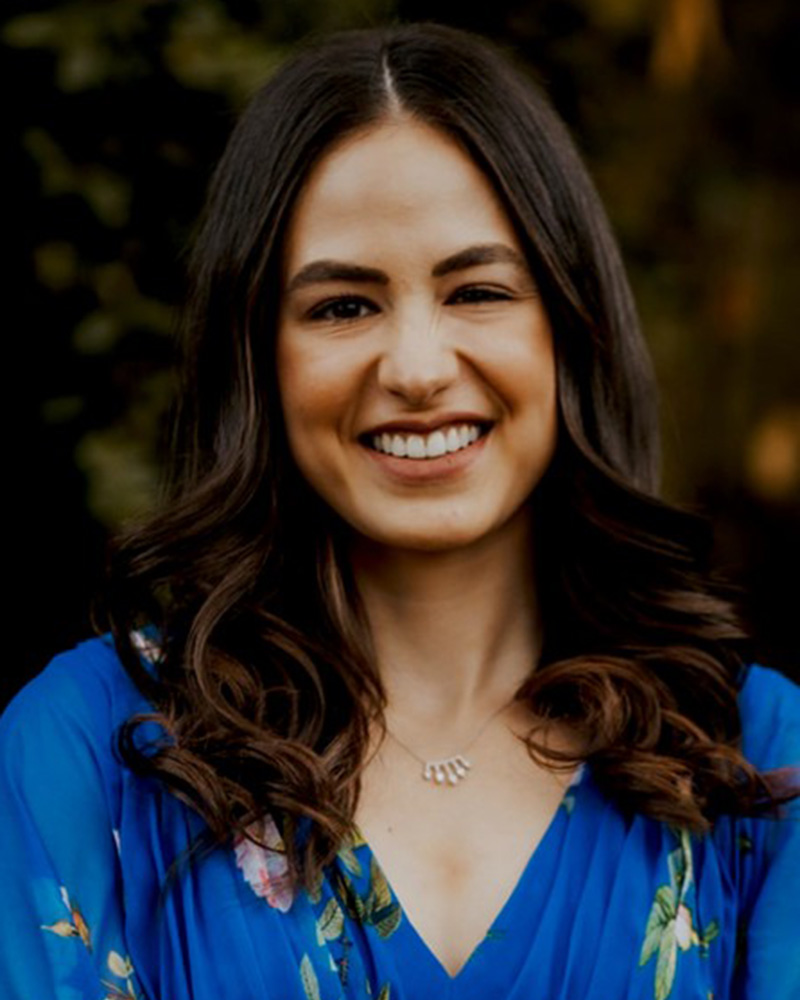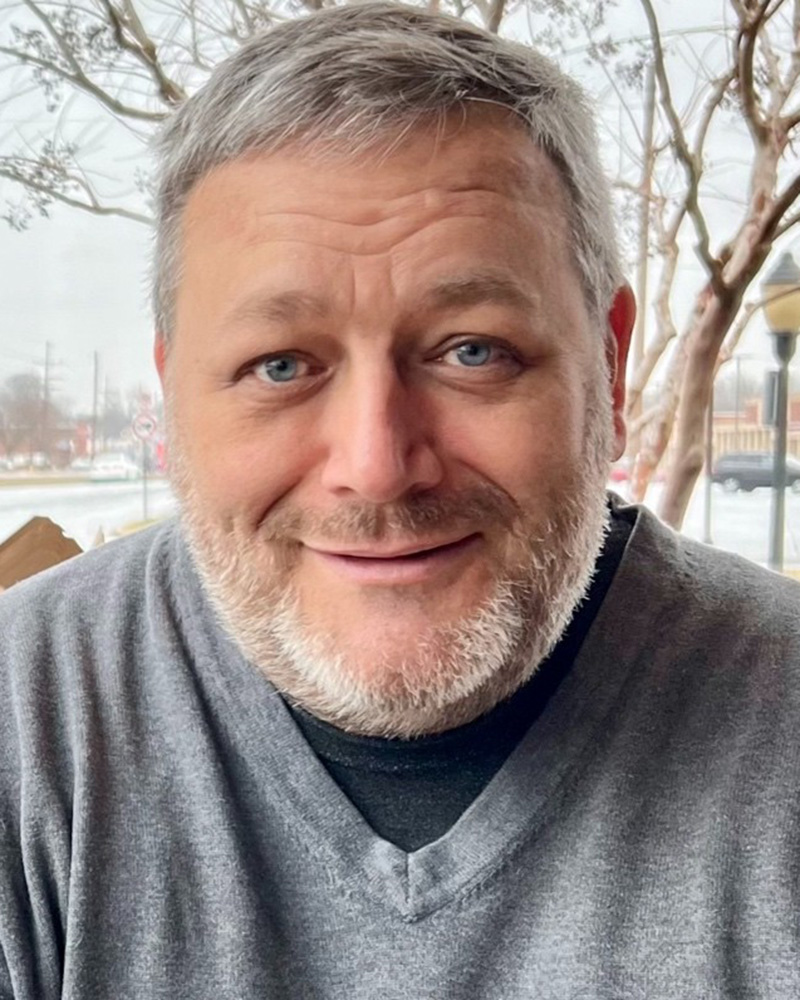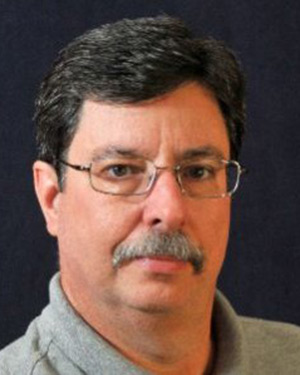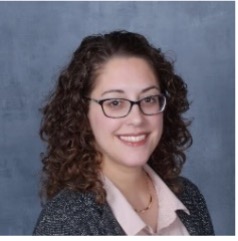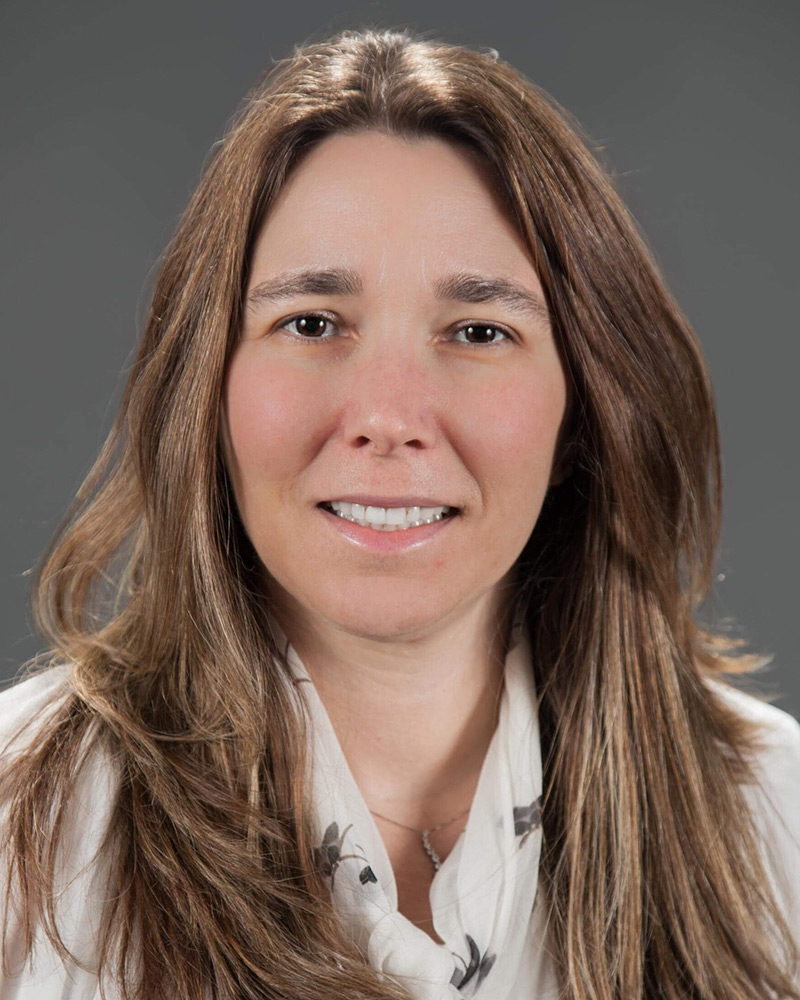INTERMEDIATE LEVEL COURSES
October 24-26, 2025
Friday, October 24, 2025, 8:00 AM – 5:00 PM
4. Intersection of Biological Safety and the Clinical Environment
Clinical environments present unique challenges, including fast-paced patient care, exposure to unknown biological agents, and high-risk procedures like autopsies and HAZMAT responses. These settings are regulated by accreditation bodies such as the Joint Commission (TJC), College of American Pathologists (CAP), and the Clinical Laboratory Improvement Amendments (CLIA) for accreditation of their spaces, personnel, work practices, and most importantly safety. At large academic teaching hospitals, the Biological Safety Office often collaborates with groups like Infection Prevention, Hospital Epidemiology, Fire and Life Safety, Engineering and Operations, Clinical Engineering, and Emergency Response to ensure compliance. These challenges require a holistic, risk-assessment based, coordinated response and increasingly the biosafety professional is called upon to play a key role in the clinical environment. This course will provide an overview of various clinical environments—inpatient units, primary and specialty care clinics, and clinical laboratories, including BSL-3—highlighting their specific risks and strategies for effective collaboration with other safety groups to mitigate the risks. This course combines interactive case studies and real-life scenarios to engage adult learners in group exercises focused on clinical risk assessment. Attendees will practice identifying and mitigating risks specific to various clinical environments. Through these exercises, attendees will gain a deeper understanding of the collaborative roles of safety groups and develop the skills needed to lead clinical teams toward a state of readiness and accreditation compliance.
Objectives:
- Describe the various clinical environments and how they differ from a traditional research environment
- Develop a working knowledge of collaborate with the various safety groups within the clinical environment
- Perform risk assessments using case studies to determine appropriate biosafety actions in clinical environments
Suggested Background: Fundamentals of Biosafety, Principles and Practices of Biosafety® (PPB), Risk Assessment
Target Audience: All Safety Professionals, All Biosafety Professionals
Audience Level: Intermediate
COURSE FACULTY
CONTACT HOURS
This course has been approved for 1.0 CM points toward RBP/CBSP recertification. ABSA International is approved as a provider of continuing education programs in the clinical laboratory sciences by the ASCLS P.A.C.E.® Program. This course is approved for 7.5 P.A.C.E.® contact hours.
Saturday, October 25, 2025, 8:00 AM – 5:00 PM
8. Emergency Planning for Biological Incidents in High-Containment Labs
Planning for emergencies in biocontainment labs is challenging and requires a specialized approach due to the presence of high-consequence pathogens and complex response needs. This course is designed for emergency managers, laboratory personnel, and response teams focusing on preparedness for biological incidents at your facility. Attendees will explore the regulatory requirements outlined in U.S. federal compliance with the Federal Select Agent Program and OSHA guidelines for developing and implementing a comprehensive incident response plan. An efficient and responsive emergency management program closely integrates with biosafety and biosecurity professionals, as well as local emergency management agencies, health departments, and first responders/receivers, to ensure an effective collaborative response. Through hands-on training, attendees will gain practical skills in incident response planning for biocontainment laboratories. Using interactive activities and case studies, participants will learn to conduct risk assessments, develop and implement comprehensive incident response plans, and coordinate effectively with local emergency management agencies. The course emphasizes a systematic planning process—guided by frameworks like FEMA’s 6-step methodology—to help attendees create tailored, compliant, and proactive emergency response strategies. This training enhances both facility preparedness and community safety in the face of biological incidents.
Objectives:
- Identify and prioritize biological risks and hazards in high-containment environments
- Apply structured emergency planning principles to support laboratory leadership decision-making
- Coordinate response efforts with internal stakeholders and external support agencies
Suggested Background: Recommend completion of the web-based course FEMA Independent Study Course IS-230 – Fundamentals of Emergency Management (for familiarization; exam not required)
Target Audience: All Safety Professionals, All Biosafety Professionals, Emergency Management and Health Preparedness Professionals
Audience Level: Intermediate
COURSE FACULTY
CONTACT HOURS
This course has been approved for 1.0 CM points toward RBP/CBSP recertification. ABSA International is approved as a provider of continuing education programs in the clinical laboratory sciences by the ASCLS P.A.C.E.® Program. This course is approved for 7.5 P.A.C.E.® contact hours.
Sunday, October 26, 2025, 8:00 AM – 5:00 PM
13. A Scenario-Based Introduction to Agricultural Biorisk Management
This course will review general concepts and considerations for assessing and managing risks encountered in research programs that involve animals, plants, pathogens, pests, facilities, equipment, and work practices relevant to agriculture. The focus will be on hazard identification, risk assessment (qualitative and quantitative), and the strategic use of mitigation practices designed to minimize risks in a wide range of agricultural research applications. Attendees will have the opportunity to practice these skills, using real-world scenarios that demonstrate some of the unique challenges and hazards routinely encountered in an agricultural environment. Exercises will be highly interactive and guide attendees through the entire biorisk management process. Emphasis will be given to key factors that influence selecting effective biocontainment and biosecurity measures; ensuring worker safety; protecting local and regionally-important agricultural commodities (livestock, poultry, crops); preserving the environment (plants, wildlife, water systems); and maintaining public health.
Objectives:
- Review hazard identification and risk assessment techniques appropriate for an agricultural research environment
- Identify practical control strategies to successfully manage hazards and risks relevant to agriculture
- Restate the need for effective biosecurity when working with high-consequence agricultural pathogens and pests
Suggested Background: BSL-3 Operations and Management, Fundamentals of Biosafety, Principles and Practices of Biosafety® (PPB), Risk Assessment
Target Audience: All Safety Professionals, Animal Caretakers, Experienced Biosafety Professionals
Audience Level: Intermediate
COURSE FACULTY
CONTACT HOURS
This course has been approved for 1.0 CM points toward RBP/CBSP recertification. ABSA International is approved as a provider of continuing education programs in the clinical laboratory sciences by the ASCLS P.A.C.E.® Program. This course is approved for 7.5 P.A.C.E.® contact hours.
Sunday, October 26, 2025, 8:00 AM – 5:00 PM
14. Facility Commissioning and Recommissioning for the BSL-3 Laboratory
The biosafety professional can assist with the start-up or maintenance of laboratory operations in support of their biosafety programs by understanding the commissioning and recommissioning processes. Laboratory commissioning, identified in containment guidance documents, is a quality assurance process for the effective functioning of biocontainment laboratories. The biosafety officer and other decision makers benefit by having a basic understanding of the commissioning and recommissioning processes and resulting documentation. This course will review the phases of the new facility commissioning process and similar process for recommissioning. This knowledge base allows the biosafety professional to recognize how commissioning assists in providing and documenting a properly operating facility. A review of the secondary containment features of the BSL-3 laboratory will be disucssed and note specific issues typically observed. There will be a focus on two issues, the reversal of directional airflow and sealing of surfaces and penetrations. Attendees will consider methods to identify the issues and present some specific mitigations of these issues; can actively participate in the commissioning/recommissioning processes and understand the methodology, the tools, results, and their interpretation; will know their facility operates correctly, its limitations, and the risk when it does not. This knowledge allows the biosafety professional to check or back check the containment spaces’ performance and use this knowledge to perform daily inspections for maintenance or replacement and control risk to the lowest level. The biosafety professional can identify required features in a new laboratory or review an existing lab with a better understanding of typical issues to assure safe reliable operations.
Objectives:
- Develop an understanding of the overall commissioning and recommissioning processes for containment labs
- Articulate the engineering controls required and effectively participate in the processes
- Identify typical issues observed during commissioning/recommissioning of the laboratory secondary containment barriers and the options for practical solutions to those issues
- Demonstrate a knowledge base and provide documentation to better perform daily inspections to reduce risk for safe and reliable laboratory operations
Suggested Background: None
Target Audience: All Safety Professionals, Laboratory Workers, Operations and Maintenance Personnel
Audience Level: Intermediate
COURSE FACULTY
CONTACT HOURS
This course has been approved for 1.0 CM points toward RBP/CBSP recertification. ABSA International is approved as a provider of continuing education programs in the clinical laboratory sciences by the ASCLS P.A.C.E.® Program. This course is approved for 7.5 P.A.C.E.® contact hours.
Sunday, October 26, 2025, 8:00 AM – 12:00 PM
17. Lessons Learned to Improve Biosafety
Preventing laboratory-acquired infections (LAIs) is a challenge for laboratory managers and biosafety professionals, especially when dealing with an emerging pathogen. It is extremely important to quickly determine if there has been an exposure, how many may have been exposed, what steps need to happen next, including any prophylaxis, root cause analysis, gaps in the biosafety plan, and additional mitigation measures that need to be implemented. This interactive course will examine published papers from the ABSA LAI Database on laboratory acquired infections and exposures to determine what we can learn to prevent future exposures. Attendees will thoroughly examine the literature on the history of lab-acquired infections, review specific published articles, utilize the Association of Public Health Laboratories (APHL) ‘Laboratory Exposure Assessment and Symptom Monitoring Guide’ (exposure assessment tool) to assess exposures, analyze data to identify root causes of exposures, discuss identified gaps, and establish additional steps required to mitigate risks. Attendees will be equipped with the skills to assess and mitigate exposure risks using the APHL Exposure Assessment Tool. Attendees will engage in scenario-based group exercises, applying a structured process to evaluate potential exposures, conduct root cause analyses, identify procedural gaps, and develop effective mitigation strategies. Through hands-on practice and guided instruction, attendees will also learn to incorporate published data on laboratory-acquired infections (LAIs) to enhance biosafety protocols. Special emphasis will be placed on applying these tools to safely manage risks associated with emerging pathogens.
Objectives:
- Describe how the ABSA LAI database can be used for biosafety training and determining how to safely work with emerging pathogens
- Utilize the APHL exposure assessment tool to assess real-life laboratory incidents for potential exposures and to help guide prophylaxis if indicated
- Analyze actual laboratory incidents to determine the root cause and what steps are necessary to mitigate future incidents
Suggested Background: Fundamentals of Biosafety, Risk Assessment
Target Audience: All Safety Professionals, Laboratory Workers
Audience Level: Intermediate
COURSE FACULTY
CONTACT HOURS
This course has been approved for 0.5 CM points toward RBP/CBSP recertification. ABSA International is approved as a provider of continuing education programs in the clinical laboratory sciences by the ASCLS P.A.C.E.® Program. This course is approved for 3.5 P.A.C.E.® contact hours.
Webinars
Virtual Professional Development Courses – Webinars
All times listed are in CENTRAL TIME ZONE
September 12 – November 14
Although these courses are part of the Professional Development Program for the 68th Annual Biosafety and Biosecurity Hybrid Conference, it is not necessary to be a conference participant to register for these courses. Registration for the virtual professional development courses must be purchased on separate registration forms from the conference registration.
Friday, September 19, 2025 | 11:00 am – 3:00 pm CDT
2V. Program Management Fundamentals for the Biosafety Professionals
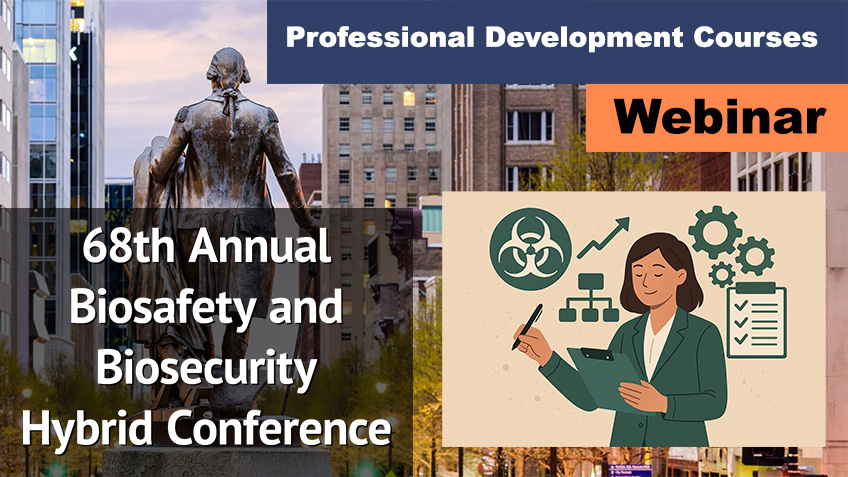
This course is designed for biosafety professionals who are responsible for overseeing biosafety departments. The principles and practices briefly covered in this course are closely related to the Program Management Professional (PMP) certification. By understanding the core competencies of the PMP framework, biosafety professionals can apply project management methodologies to enhance the planning, execution, and evaluation of their biosafety programs. This integration of program management skills with biosafety expertise ensures that participants are well-prepared to lead effective, compliant and sustainable biosafety programs within their organizations. In addition, the course aligns with key international standards and guidelines, such as ISO 35001, which specifies requirements for a biosafety risk management system. Participants will gain insights into how to integrate ISO 35001 principles into their biosafety programs, ensuring a systematic and effective approach to biosafety risk management. The course also covers the World Health Organization (WHO) Biosafety Programme Management Associated Monograph, providing a global perspective on best practices for managing biosafety risks. By familiarizing themselves with the WHO guidelines, participants will be better equipped to implement and maintain robust biosafety programs that meet international standards.
What You’ll Learn
- Integration of Project Management Methodologies – Focus on planning, execution, and evaluation of biosafety initiatives using structured project management tools and techniques
- Implementation of ISO 35001 Standards – Emphasis on creating a systematic and effective approach to managing biosafety risks.
- Adoption of WHO Biosafety Programme Guidelines – Provides a global perspective and best practices for managing biosafety risks in compliance with international expectations
Objectives:
- Summarize program management principles and methodologies tailored specifically for biosafety applications
- Recognize skills needed to identify, assess, and mitigate management risks effectively
- Apply PMP, ISO 35001 and WHO applications to biosafety
Suggested Background: Fundamentals of Biosafety
Target Audience: New Biosafety Professionals, All Safety Professionals
Audience Level: Intermediate
Course Length: 4 hours (with a 15-minute break)
Questions
Please direct questions about this course to:
KariAnn DeServi, MEd
Director of Education, ABSA
866.425.1385 / education@absa.org
To receive the ABSA member rate, participants must be current ABSA members during the training year.
Course was one 4-hour session. Within 10 business days of purchasing the recording, you will be added to the course on the ABSA International Training Site. If you have already taken ABSA courses, then you will receive an enrollment notification. If you are a new user, you will receive an invitation to create your account on the ABSA International Training Site. Once the account is created, you will see the course on your course dashboard. You will have 60 days to complete the course.
COURSE FACULTY
COURSE FEES
ABSA Member: $300
Non-member: $390
To receive the ABSA member rate, participants must be current ABSA members during the training year. Fees include course handouts, access to the ABSA International training site, and 4 hours of expert-led interactive instruction.
CONTACT HOURS
This course has been approved for 0.5 CM points toward RBP/CBSP recertification. *ABSA International is approved as a provider of continuing education programs in clinical laboratory sciences by the ASCLS P.A.C.E.® Program. This course is approved for 3.5 P.A.C.E.® contact hours. Course access links are unique and for individual use only. Sharing is prohibited. Duplicate logins or unregistered attendees will be removed from the webinar without a refund.
Tuesday, September 30 and Thursday, October 2, 2025 | 11:00 am – 3:00 pm CDT
4V. Clinical Biosafety Essentials: A Guide to Integrating Safety Practices from Research to Clinical Environments
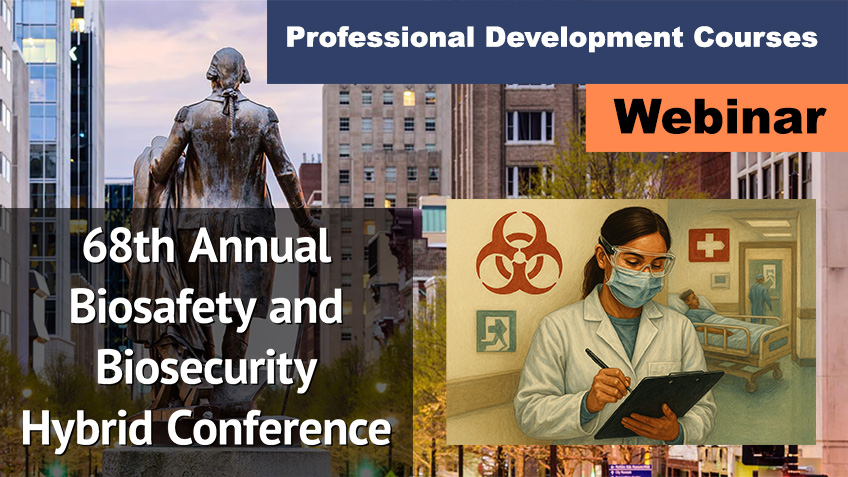
This course addresses the growing need for Biosafety Professionals to apply biosafety principles in the clinical environment. Clinical trials for biological therapeutics are becoming increasingly common. Therefore, safety professionals on regulatory committees such as the Institutional Biosafety Committee must possess a strong understanding of clinical safety, terminology, and regulatory requirements in order to perform an adequate risk assessment of the proposed hazard mitigation measures for these studies. In this course we will explore various clinical spaces, their unique biosafety considerations, and relevant hospital regulations that apply to patient safety, staff safety and a safe environment of care. You will also acquire the knowledge necessary to apply these safety practices in accordance with both research and clinical safety regulations while developing, in collaboration with clinical colleagues, processes that maintain staff safety at all levels.
What You’ll Learn
- Clinical Biosafety Principles and Environments – explore biosafety applications in clinical settings, including various types of clinical spaces
- Regulatory Knowledge for Clinical Trials – gain the skills needed to participate effectively on Institutional Biosafety Committees (IBCs)and evaluate hazard mitigation strategies
- Collaborative Safety Process Development – emphasis on maintaining staff safetywhile aligning with both research and clinical safety regulations
Objectives:
- Describe inpatient, procedural, and outpatient clinical environments, detailing the risks of pathogen transmission within each and how these risks shape the application of biosafety practices
- Compare and contrast Biosafety Levels, Standard Precautions, and Isolation Precautions
- Apply research and clinical safety guidelines during regulatory committee reviews of human gene therapy clinical trial applications
- Identify the various clinical roles that facilitate the practical implementation of these precautions
Suggested Background: Fundamentals of Biosafety
Target Audience: Experienced Biosafety Professionals, All Safety Professionals
Audience Level: Intermediate
Course Length: 8 hours (two 4-hour live sessions, each with a 15-minute break)
Questions
Please direct questions about this course to:
KariAnn DeServi, MEd
Director of Education, ABSA
866.425.1385 / education@absa.org
To receive the ABSA member rate, participants must be current ABSA members during the training year.
Course was two 4-hour sessions. Within 10 business days of purchasing the recording, you will be added to the course on the ABSA International Training Site. If you have already taken ABSA courses, then you will receive an enrollment notification. If you are a new user, you will receive an invitation to create your account on the ABSA International Training Site. Once the account is created, you will see the course on your course dashboard. You will have 60 days to complete the course.
COURSE FACULTY
COURSE FEES
ABSA Member: $500
Non-member: $670
To receive the ABSA member rate, participants must be current ABSA members during the training year. Fees include course handouts, access to the ABSA International training site, and 8 hours of expert-led interactive instruction.
CONTACT HOURS
This course has been approved for 1.0 CM points toward RBP/CBSP recertification. *ABSA International is approved as a provider of continuing education programs in clinical laboratory sciences by the ASCLS P.A.C.E.® Program. This course is approved for 7.5 P.A.C.E.® contact hours. Course access links are unique and for individual use only. Sharing is prohibited. Duplicate logins or unregistered attendees will be removed from the webinar without a refund.
Tuesday, October 7, 2025 | 11:00 am – 3:00 pm CDT
5V. Integrating AI into Biotechnology: A Biosecurity Risk Assessment Workshop (Part 2) – Embodied AI and Automation in Biorisk Management
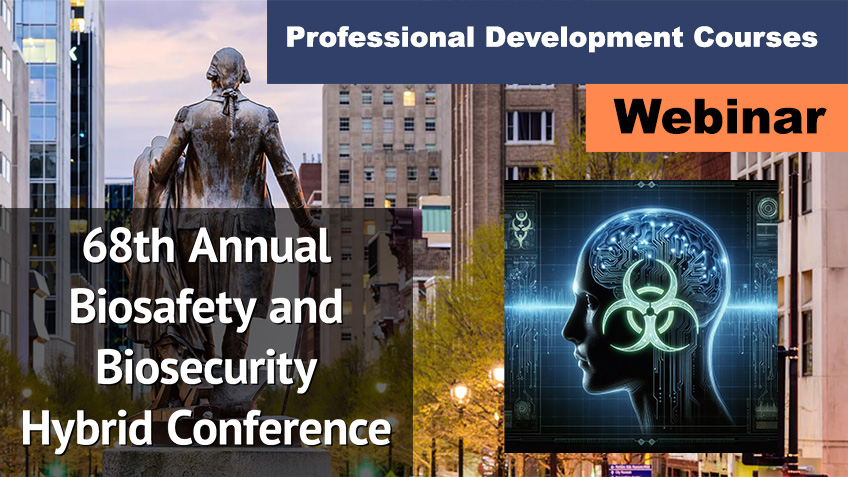
As AI becomes increasingly integrated into laboratory operations and risk management, it presents both challenges and opportunities for improving safety and mitigating biological threats. This advanced workshop builds on last year’s course, focusing on biosecurity risk assessment frameworks for AI-enabled systems, with a focus on embodied AI agents and automation. Drawing from recent advances, including the use of humanoid robotic systems with AI in high-containment environments, this course will combine theoretical foundations with hands-on applications. Attendees will engage in case studies and group exercises to assess biosecurity risks associated with AI-driven tools and systems in laboratory settings.
What You’ll Learn
- AI in Biotechnology – Explore current AI technologies and their biotech applications
- Biosecurity Risk Assessment – Discuss key concepts: vulnerability, threat, consequence, and mitigation—tailored for AI systems
- Case Studies & Scenarios – Analyze real-world examples of AI in biotech by assessing associated risks and discussing appropriate mitigation strategies
- Hands-On Risk Assessment – Work in teams to evaluate a hypothetical AI system, identify vulnerabilities and threats, assess AI system maturity and automation, determine potential consequences and risk levels, and propose mitigation strategies
Objectives:
- Explain the integration of AI—including embodied AI agents into research and high-containment laboratories
- Identify novel biosecurity risks arising from AI-driven automation and predictive modeling in biotechnology
- Apply an AI-tailored biosecurity risk assessment framework accounting for automation maturity, human-agent interactions, and real-world risk mitigation scenarios
Suggested Background: Biosafety and Biosecurity Training Course (BBTC®), Fundamentals of Biosafety, Principles and Practices of Biosafety® (PPB), Risk Assessment
Target Audience: All Safety Professionals, All Biosafety Professionals
Audience Level: Intermediate
Course Length: 4 hours (with a 15-minute break)
Questions
Please direct questions about this course to:
KariAnn DeServi, MEd
Director of Education, ABSA
866.425.1385 / education@absa.org
To receive the ABSA member rate, participants must be current ABSA members during the training year.
Course was one 4-hour session. Within 10 business days of purchasing the recording, you will be added to the course on the ABSA International Training Site. If you have already taken ABSA courses, then you will receive an enrollment notification. If you are a new user, you will receive an invitation to create your account on the ABSA International Training Site. Once the account is created, you will see the course on your course dashboard. You will have 60 days to complete the course.
COURSE FACULTY
COURSE FEES
ABSA Member: $300
Non-member: $390
To receive the ABSA member rate, participants must be current ABSA members during the training year. Fees include course handouts, access to the ABSA International training site, and 4 hours of expert-led interactive instruction.
CONTACT HOURS
This course has been approved for 0.5 CM points toward RBP/CBSP recertification. *ABSA International is approved as a provider of continuing education programs in clinical laboratory sciences by the ASCLS P.A.C.E.® Program. This course is approved for 3.5 P.A.C.E.® contact hours. Course access links are unique and for individual use only. Sharing is prohibited. Duplicate logins or unregistered attendees will be removed from the webinar without a refund.
Wednesday, October 8, 2025 | 11:00 am – 3:00 pm CDT
6V. Anatomy of an IBC meeting: Understanding the Structure, Function, and Operations of an Institutional Biosafety Committee

This four-hour course provides an in-depth look at the anatomy of an Institutional Biosafety Committee (IBC) meeting, exploring its role within the broader biosafety program. Participants will gain a comprehensive understanding of IBC meeting operations, including committee structure, member responsibilities, and the processes that ensure compliance and risk mitigation. Topics covered include the intersection of biosafety programs and IBC functions; roles and responsibilities of IBC members, biosafety staff, and ad-hoc consultants based on their expertise; managing nonconformity issues and implementing corrective actions; the role of pre- and post-IBC meetings in streamlining operations; utilizing the IBC meeting matrix to improve efficiency and decision-making; engaging special reviewers and external consultants when needed; structuring an IBC meeting into different sections such as recombinant DNA, infectious agents, IRE, and subcommittees; handling NIH reportable incidents and urgent post-submission requests; and understanding IBC registration forms, help documents, and compliance tools. Through case studies and discussion-based activities, attendees will leave with a clearer understanding of how to effectively contribute to and enhance IBC meetings. This course is ideal for current and prospective IBC members, biosafety professionals, and institutional stakeholders involved in biological research oversight.
What You’ll Learn
- Structure and Operations of IBC Meetings – learn how Institutional Biosafety Committee (IBC) meetings are structured, including the roles of members, biosafety staff, and consultants
- Compliance, Risk Mitigation, and Decision-Making Tools – how to ensure regulatory compliance, manage nonconformities, and implement corrective actions.
- Effective Participation and Collaboration – learn how to collaborate with internal and external stakeholders, including special reviewers and consultants, to enhance biosafety oversight
Objectives:
- Identify the key functions of an IBC, the intersection with the biosafety program, and the roles and responsibilities of committee members, biosafety staff, and ad-hoc consultants based on their expertise
- Utilize pre- and post-IBC meetings, and implement tools like the IBC matrix, special reviewers, and subcommittees to streamline processes
- Summarize handling nonconformities and NIH reportable incidents, urgent requests, ad hoc meetings, and the use of registration forms and compliance documents to support institutional biosafety oversight
Suggested Background: None
Who Should Attend: All Safety Professionals, New Biosafety Professionals, Laboratory Workers
Audience Level: Intermediate
Course Length: 4 hours (with a 15-minute break)
Questions
Please direct questions about this course to:
KariAnn DeServi, MEd
Director of Education, ABSA
866.425.1385 / education@absa.org
To receive the ABSA member rate, participants must be current ABSA members during the training year.
Course is one 4-hour session. Within 10 business days of purchasing the recording, you will be added to the course on the ABSA International Training Site. If you have already taken ABSA courses, then you will receive an enrollment notification. If you are a new user, you will receive an invitation to create your account on the ABSA International Training Site. Once the account is created, you will see the course on your course dashboard. You will have 60 days to complete the course.
COURSE FACULTY
COURSE FEES
ABSA Member: $300
Non-member: $390
To receive the ABSA member rate, participants must be current ABSA members during the training year. Fees include course handouts, access to the ABSA International training site, and 4 hours of expert-led interactive instruction.
CONTACT HOURS
This course has been approved for 0.5 CM points toward RBP/CBSP recertification. *ABSA International is approved as a provider of continuing education programs in clinical laboratory sciences by the ASCLS P.A.C.E.® Program. This course is approved for 3.5 P.A.C.E.® contact hours. Course access links are unique and for individual use only. Sharing is prohibited. Duplicate logins or unregistered attendees will be removed from the webinar without a refund.
Tuesday, November 4 and Thursday, November 6, 2025 | 10:00 am – 2:00 pm CST
9V. Keeping it Going: Maintaining and Improving a Select Agent Program Over the Long Term
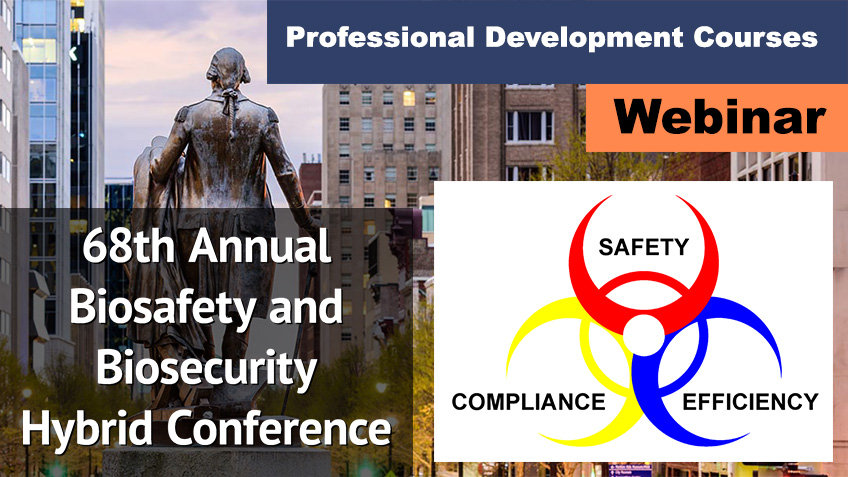
Keeping a select agent program going can be difficult, especially in the face of ever-changing regulatory requirements and limited resources. Established procedures may suddenly become unacceptable, interrupting research and frustrating laboratorians. Likewise, a single unexpected adverse event can put an entire program at risk. Being prepared to deal with such changes and events is critical to maintaining a robust program. Anticipating future challenges can be even more advantageous, elevating a program from good to great. A proactive approach can minimize the impact of new requirements and reduce duration and frequency of crises sparked by sudden, unexpected requirements or events. This course will explore strategies for maintaining and improving an existing program, including how to anticipate and respond to new requirements. The focus will be on U.S. select agent requirements, although a small section on comparable requirements in the international community will be included. Strategies will be based on the instructors’ experience with their program with additional input solicited from class attendees during open discussions. Topics will include select agent program history; effective oversight; efficiently meeting ongoing requirements; reporting, responding to, and analyzing incidents; suitability program case studies; inactivation requirements, including “failure” investigation; and inspection preparation and response. The course will consist of topical presentations followed by group discussions aimed at facilitating application of presented strategies to attendees’ individual programs and providing a platform to capitalize on attendees’ collective experience.
What You’ll Learn
- Regulatory Compliance and Program Oversight – understand and navigate S. Select Agent Program requirements
- Incident Management and Program Resilience –reporting, respond to, and analyze incidents, including inactivation failures and prepare for and respond to inspections
- Strategic Program Improvement and Risk Anticipation – apply strategies to improve efficiency, minimize disruptions, and strengthen overall program robustness
Objectives:
- Identify strategies to efficiently maintain a compliant select agent program and anticipate future regulatory focus
- Develop effective approaches for preparing for inspections and implementing required changes
- Review a series of suitability program case studies and identify strategies for dealing with potential suitability concerns
- Summarize inactivation requirements and identify successful strategies for compliance
Suggested Background: None
Who Should Attend: All Safety Professionals, Select Agent Program Safety Professionals
Audience Level: Intermediate
Course Length: 8 hours (2 4-hour live sessions, each with a 15-minute break)
Questions
Please direct questions about this course to:
KariAnn DeServi, MEd
Director of Education, ABSA
866.425.1385 / education@absa.org
To receive the ABSA member rate, participants must be current ABSA members during the training year.
Course is two 4-hour sessions. Within 10 business days of purchasing the recording, you will be added to the course on the ABSA International Training Site. If you have already taken ABSA courses, then you will receive an enrollment notification. If you are a new user, you will receive an invitation to create your account on the ABSA International Training Site. Once the account is created, you will see the course on your course dashboard. You will have 60 days to complete the course.
COURSE FACULTY
COURSE FEES
ABSA Member: $500
Non-member: $670
To receive the ABSA member rate, participants must be current ABSA members during the training year. Fees include course handouts, access to the ABSA International training site, and 8 hours of expert-led interactive instruction.
CONTACT HOURS
This course has been approved for 1.0 CM points toward RBP/CBSP recertification. *ABSA International is approved as a provider of continuing education programs in clinical laboratory sciences by the ASCLS P.A.C.E.® Program. This course is approved for 7.5 P.A.C.E.® contact hours. Course access links are unique and for individual use only. Sharing is prohibited. Duplicate logins or unregistered attendees will be removed from the webinar without a refund.






